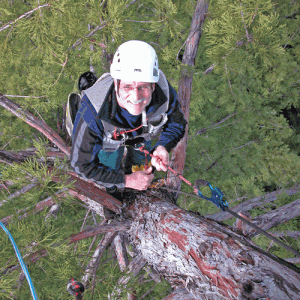Todd Dawson
(The Chief)
Professor – Departments of Integrative Biology (primary) andEnvironmental Science, Policy, & Management
Director – Center for Stable Isotope Biogeochemistry
Faculty Director – Blue Oak Ranch Reserve
Contact Info:
- Office: 4006 Valley Life Sciences Building
- Office telephone: (510) 642-6090
- Lab telephone: (510) 642-1054
- Email: tdawson@berkeley.edu
Research Interests
As noted at the beginning of my lab group’s home page our research is focused on the interface between plants and their environments with a special emphasis placed on exploring this interface from a functional perspective. Research projects therefore apply the tools from physiological and evolutionary plant ecology, ecosystem science, stable isotope biogeochemistry and remote sensing and modeling towards the study and interpretation of the plant-environment interface. We work across an array of study systems, scales, organisms, and questions that draw upon a variety of empirical and theoretical methods. These are merged with the application of diverse approaches (observations, monitoring, and experimental manipulations) as avenues for improving our understanding of how the ecophysiological characteristics of plants are shaped by and respond to the environments they inhabit.
The projects I lead or participate in pay special attention to how aspects of plant form and function combine to permit adaptation to environmental variation, whether naturally or anthropogenically imposed, and how plants and their unique traits influence the structure and function of the communities and ecosystems they compose or that they have membership with. Recently, many projects have been structured around global climate and land-use changes as the foundational rationale for the studies we undertake but our goals are to always make sure to are working on fundamental biological features.
Besides working with the students and postdocs in the group on the projects they lead, my own research time is split between several collaborative investigations. These ongoing investigations are focused on questions or hypotheses directed towards the key organisms themselves (e.g., redwoods, oaks), the communities or ecosystem processes that these organisms impact (e.g., hydrological [see Tracking Raindrops], “Hydrowatch”, biogeochemical), or broad themes that form the foundation of the field of science I have and continue to work in (e.g., the functional basis of adaptation, “ecosystem physiology” or the roles of plants in higher order processes, how and why ecophysiology shapes species distribution, etc.). Currently, field research in California, Mexico and South Africa occupy my thoughts and time. In the laboratory I continue to be keenly interested in pushing technology development that is central to helping us answer our questions and test our hypotheses. This aspect of my research is also very much collaborative and crosses the fields of chemistry (working on new stable isotopes methods and instruments), computer science and engineering (working with wireless sensor networks in an environmental context), and remote sensing (working with satellite-based images and data and other remotely sensed information like LiDAR).
Teaching
I teach four principle (core) courses, two that alternate in the spring term (in odd years, Physiological Plant Ecology [IB 151/151L] and in even years, Stable Isotope Ecologyy [IB c227/ESPM c220 co-taught with Stefania Mambelli), one that I teach every fall semester (Training in Stable Isotope Methods and Mass Spectrometry [IB 400] and one graduate discussion group that I co-teach every fall with Stefania Mambelli (“Isotopics” [IB c226/ESPM c225).
I am also regularly involved in three other minor / occasional courses; “Ecolunch” [IB 251] that is co-lead by IB ecology faculty every semester, occasional “special topic” graduate seminars [IB 250] and nearly every semester I supervise one or more undergraduate research course credits [“199”].
